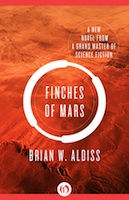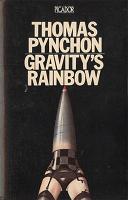 Firstly, and foremostly, to introduce Brian Aldiss. Er. Brian has been at the forefront of Science Fiction for longer than most of us can remember (let's just say he's been writing for my entire life time, and I'm no spring chicken) – he has turned 90 in August (but is still writing, even if he announced this book to be his final SF novel), he's been a Science Fiction Grand Master since 1999 (yup, last Millennium), and has won about everything that is to be won along the way. No, I'm not going to count the books, he's written tons, both SF and other, he's published loads of short stories, he's been involved in endless collections... reading through his entire oeuvre would be a daunting task!
Firstly, and foremostly, to introduce Brian Aldiss. Er. Brian has been at the forefront of Science Fiction for longer than most of us can remember (let's just say he's been writing for my entire life time, and I'm no spring chicken) – he has turned 90 in August (but is still writing, even if he announced this book to be his final SF novel), he's been a Science Fiction Grand Master since 1999 (yup, last Millennium), and has won about everything that is to be won along the way. No, I'm not going to count the books, he's written tons, both SF and other, he's published loads of short stories, he's been involved in endless collections... reading through his entire oeuvre would be a daunting task!
Finches of Mars, then – the book was originally published in 2013, and is now re-published, presumably in honour of his 90th birthday, by OpenRoad Media. He had announced this to be his final SF story, but I understand there are question marks around this, given that he's still actively writing... but either way, here are my thoughts on that book.
The setting uses a classic golden-age SF trope: the settlement of Mars. What we find in the book is a human colony, in 6 separate towers, located on the Tharsis shield (locally known as 'The Prospect'), where Curiosity and its follow-up expeditions had identified water under the surface. The 6 towers are called Chinese, West, Russ-East, Singa-Thai, Scand, and Sud-Am; this should give you an idea of the geographical spread of the endeavor. This is run, and supported (the settlement is by no means self-sustaining) by the UU, the United Universities, a multi-national organisation created and run by a fascinating individual called Herbert Amin Saud Mangalian. The book does not really explain how these Universities manage to afford such an expedition, and its upkeep – there must have been an enormous amount of money materialising in the funding of those in comparison to today.
All the colonists are carefully chosen, for their knowledge, abilities, psychological suitability, and their dedication to the cause, as a trip to Mars is one-way only. The environment on Mars is strictly controlled, with strict ID and health (it is never explained why) checks upon entering a tower, and there is much mistrust and animosity between the towers. There is statutory exercise people have to take, there are no drugs, no pets, definitely totally absolutely no religion, and everybody is given a new, computer-generated name when they join. And still, Aldiss compares, nah, contrasts this with police states, which are only stable due to the control exerted. I marveled.
Whilst some of the foreground activity and descriptions sound quite romantic, or, in cases, even poetic the book definitely gives the impression that there's something much darker below said surface quite early on. One thing the setting reminded me of was an Ark, or also Somtow Sucharitkul's story 'Avoiding Close Encounters'. Especially the Ark setting is apt, I learned – Mangalian's argumentation driving the entire setup is that Earth is overpopulated, and is messed up. Humanity will never go straight, so to ensure its survival we need to start again, on Mars, with a selected Elite; to avoid the pitfalls the 2nd time around. I cannot imagine how this argument must have gone down with the unwashed masses he was offending, or how he convinced Earth and UU to follow through with this. This is, in my view, unrealistic elitist twaddle, even if I agree with the thrust of the 1st half of the argument...
Given that this is set quite a bit into the future (Curiosity was before the protagonists were born) there is remarkably little in terms of new technology, or different/more advanced uses of things we are familiar with. We get something called screamers, which seems to be a kind of short-range communications/video link. What seems to have been changed is the efficiency of materials and kit (as evidenced in the environmental suits and breather masks in use), or in the fact that the Chinese apparently can manufacture and launch a space plane in 9 days for a rescue mission – that is impressive indeed.
We also have made some discoveries – Earth has a companion sun, ie we are essentially in a binary star system, with a dwarf star beyond the Oort cloud. I cannot imagine why we would not have detected this, but there you are. They called it 'Nemesis', by the way, for no reason that's given. There also is a new particle that has been discovered, called the Normon. It's nothing like the particles we know of today, it's got something to do with the creation of life, and it mainly originates with Nemesis. We never learn exactly what it is, does, or its bearing on the story, though.
Some parts of the book are excursion, displays of ideas, instead of worked out stories. Some of those did just fine for me (I'm frequently fine with being told instead of having everything shown). Other parts like this though jarred, and were too obviously fragments not worked into the main threads, or the background.
The story itself is also told in very different modes, in different voices, with different approaches. It feels inconsistent, unfinished in many parts. And whilst a lot of what is being shown and told is rather fascinating it frequently leaves the reader with the feeling that the author is trying to impart some message, some morals or lessons, but is not entirely sure himself what these are.
For example – the book goes on (and on) concerning religion (which is not welcome on Mars), but I'm still unclear if he is pro or contra religion, all the more so given his theory of what a religion is, and the heavy overlap with philosophy this definition displays.
To me it became very clear that the humanity they are trying to save on Mars clearly shows that it is also not worth saving. Even this noble enterprise is tainted by the same kind of – original sin? - as the Earth-bound rest which is busily tearing itself apart.
Overall I wondered if the frequent stylistic changes, the long list of protagonists entering and leaving the story at random and frequently without any impact on the actual proceedings might be a stylistic choice. Might...
Either the author is doing something terribly clever and highbrow here which completely passes me by (and apologies for being a philistine in that case), but in summary I found this to be an uneven, unfinished story, with a rather solipsistic and human-centered view of the world and the universe. It's all a bit Riding the Torch, just not as solidly worked out...
For fans only, I feel.
More Brian W. Aldiss
Title: Finches of Mars
Author: Brian W. Aldiss
Reviewer: Markus
Reviewer URL: http://thierstein.net
Publisher: Open Road Media
Publisher URL: http://www.openroadmedia.com
Publication Date: September 2015
Review Date: 150711
ISBN: 9781504005890
Price: USD 12.99
Pages: 189
Format: ePub
Topic: SF
Topic: Colonisation
Thanks to the publisher for the review copy.













